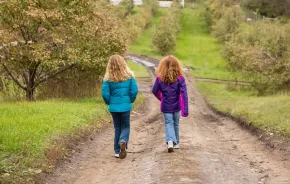 Researchers at Harvard have figured out something about parents that we ourselves might not know or else not be willing to admit: While most of us say we highly value instilling moral concepts like kindness toward others and a sense of fairness in our children, in action and deed it appears we often put the conflicting values of personal happiness and achievement first.
Researchers at Harvard have figured out something about parents that we ourselves might not know or else not be willing to admit: While most of us say we highly value instilling moral concepts like kindness toward others and a sense of fairness in our children, in action and deed it appears we often put the conflicting values of personal happiness and achievement first.
And it's impacting the values our kids adopt.
A new report from the Harvard Graduate School of Education, released yesterday, found that about 80 percent of youth surveyed reported that their parents are more concerned about achievement or happiness than caring for others.
Youth were also three times more likely to agree than disagree with this statement: “My parents are prouder if I get good grades in my classes than if I’m a caring community member in class and school,” according to the report, called The Children We Mean to Raise.
And, researchers say, kids are shaping their own values based on their perceptions of us, their parents: When asked to rank what was most important to them: “caring for others,” “achieving at a high level,” or “being a happy person (feeling good most of the time),” only 22 percent of students picked caring as their top value. Forty-eight percent chose achievement, and 30 percent selected happiness first.
The data and insights, part of an effort called the Making Caring Common project, are based in part on a survey of 10,000 middle and high school students from 33 schools representing diverse youth from across the nation, as well as gleaned from associated research and a decade of interviews with students, parents and teachers.
One main message: Parents are hypocrites, or at least falling down on the job we claim we want to do.
"To some degree we are all born with a certain degree of empathy. But in other ways it's like learning an instrument or a sport: If you practice and have guidance from adults, you can get better as you go."
According to a 2012 study, 96 percent of parents surveyed viewed developing moral character in children as “very important, if not essential” and highly valued their children “being honest, loving, and reliable.” Another cited study shows that parents across race and ethnic groups value caring or “benevolence” more than both achievement and power.
But, the report states, parents are drowning out our own messages about showing concern for others with our more urgent, louder messages about achievement and happiness.
The research might seem to some to be a bit of a downer — like we need more things to feel bad about as modern parents? — but take heart: Parents and kids do care about kindness and fairness, said Rick Weissbourd, lead researcher and co-director of the Making Caring Common project.
"We have a lot of great kids out there. Many kids and adults care about caring. But it’s subordinated. I've been talking about this stuff to parents for a lot of years now and I'm always struck by, although no one disagrees with me, everybody thinks it's someone else, it's not them. But it's all of us."
"Our tendency is to say to our kids 'the most important thing is you are happy, not that you are kind and have integrity.'"
How does the research translate to a regular tween's or teen’s life?
- If students didn’t prioritize caring and they didn’t think their parents did, then they scored low on an empathy scale.
- Students who placed a low priority on caring in relation to achievement and happiness were less likely to say they would volunteer on a Saturday to help at a school event.
- Youth who believed their parents placed a low value on caring were less likely to say they would tutor a friend.
So exactly how are we faking our kids out — claiming we care about certain values that support the common good but instead prizing other values that benefit the individual first and foremost?
Researchers say it’s in not-so-subtle and more subtle ways: When we argue with teachers for better grades, harangue coaches for more field time for our kid, don’t require our kids to reach out to a friendless child on the playground, or when we cater to our child’s every need so that — surprise, surprise — she has difficulty showing concern for anyone other than herself.
Ouch.
To a certain degree, some of the study’s results are a reflection of our economic and cultural times and the academic pressures kids face today, Weissbourd said.
"I have to lie to kids here about my [low] GPA so they won’t look down on me," reported one youth.
"I'm tempted to gloat to the person next to me when I get a good grade rather than help them understand," said another.
When asked to choose their top values, students were over four times more likely to pick hard work than fairness and, overall, about two-thirds ranked hard work as more important than fairness. In addition, over 60 percent ranked hard work above kindness. The numbers correspond with other research that shows a large percentage of students report that they've cheated on tests or homework and feel huge pressure to do well academically.
But wait a minute — what's wrong with hard work? Many parents would proudly say that value that ethic, and those of personal achievement and happiness.
Hard work is an admirable value and an important ingredient to success, these researchers say. But they are want us to remember that fairness is key to a healthy society.
Researchers point out what might be obvious but easily forgotten: Caring for others, and prioritizing personal values like altruism and fairness, actually does make people happy.
And there is an opposite irony, they state in the report: "The intense focus on achievement and happiness can make children not only less caring, but also less happy.”
Not all altruism is learned behavior, Weissbourd said. "To some degree we are all born with a certain degree of empathy. But in other ways it's like learning an instrument or a sport: If you practice and have guidance from adults, you can get better as you go and build those routines."
So how do we course-correct?
First, take heart. Youth still did value kindness and fairness even if it wasn’t at the top of their list.
"If I am a good person who cares about others then in my mind I am already Happy," one student said.
"I like to help others. Sometimes I help others to the point where I don’t even get enough time to help myself; however, it makes me feel good inside to know that someone who is struggling has less on their shoulders," another said.
The big goal is for kids to have some moral identity or ethical identity, Weissbourd said; for the fact of being a good person to feel like it’s "in their bones." Some researchers educators call it being a "first responder" — "agents of change, who have the capacity to swoop in and be healing, nurturing, supporting to others."
Weissbourd’s team at Harvard’s Making Caring Common project gives us these guidelines:
Children and youth need ongoing opportunities to practice caring and helpfulness, sometimes with guidance from adults. Daily repetition — whether it’s helping a friend with homework, pitching in around the house, having a classroom job, or working on a project on homelessness—and increasing challenge make caring second nature and develop and hone youth’s caregiving capacities.
Children and youth need strong moral role models. Being a role model doesn’t mean that we need to be perfect or have all the answers. It means grappling with our flaws, acknowledging our mistakes, listening to our children and students, and connecting our values to their ways of understanding the world.
Children need to be guided in managing destructive feelings. Often the ability to care for others is overwhelmed by anger, shame, envy, or other negative feelings. We need to teach children that all feelings are ok, but some ways of dealing with them are not helpful.
Other ideas: Talk to your kids about social justice and injustices. Pose ethical and philosophical dilemmas and queries and discuss/debate them as a family. Explore questions of right and wrong that come up in your family, in movies and in books.
What do you think: Are you modeling the right values and ethics to your kids?
For more information and ideas on raising caring and fair kids, check out Making Caring Common.












